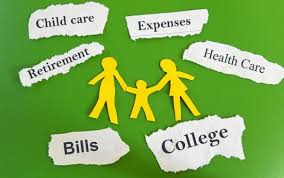Budgeting Plans For When a Child Comes into Your Life – Contributed by Tokie Laotan-Brown
 When a child comes into your life, you are guaranteed a whirlwind ride, from baby showers to naming ceremonies – it is a constant flow of advices, best practises from moms, moms in law and well wishers. It is definitely a time to rejoice, but it can also be really overwhelming. There’s so much to cope with, including the stark realisation that a full night’s sleep will probably elude you for “centuries” to come. In those dazed and confused early days of parenthood, it’s no wonder so many new parents are prone to making financial mistakes. But you don’t have to — with a bit of foresight and planning you can reduce some over the top money mistakes:
When a child comes into your life, you are guaranteed a whirlwind ride, from baby showers to naming ceremonies – it is a constant flow of advices, best practises from moms, moms in law and well wishers. It is definitely a time to rejoice, but it can also be really overwhelming. There’s so much to cope with, including the stark realisation that a full night’s sleep will probably elude you for “centuries” to come. In those dazed and confused early days of parenthood, it’s no wonder so many new parents are prone to making financial mistakes. But you don’t have to — with a bit of foresight and planning you can reduce some over the top money mistakes:
Buying too much baby stuff is a definite no, no!!! From over the top buggies to that expensive hand-knit baby cap (in warm countries), you can end up spending a ton of money on things you will never use. When it comes to getting ready for baby, a little careful planning can help you avoid spending hundreds on items that will merely gather dust in suitcases or wardrobes. Before the baby is born, you don’t actually need much to get started.
Buying everything new– Your new baby won’t stay tiny forever — no big surprise there, but it does mean that they’ll go through their sleepers really quickly. And their needs will change constantly. That’s why hand-me-downs are a new parent’s best friend.
A savings plan for your new baby…which leads us to yet another mistake new parents tend to make: Ignoring education savings.
It is never too soon to start putting money away for your child’s education.
Ignoring your own financial needs – Having a new baby is a huge life adjustment — and often it means a reduced income when one parent leaves work to stay home. There are a couple of things parents tend to ignore when their kids are young, and retirement savings is a big area of neglect. Planning for your retirement is part of being a parent — do you really want your kids to have to support you financially when you stop working? Don’t lose sight of your financial plan just because you have small children to take care of.
Not having a will – A will doesn’t just spell out who gets what when you die — it also sets out what would happen to your children if you and your spouse died at the same time. Without a will that names your child’s legal guardian, the court will appoint one, no matter what your wishes might have been. The same goes for your money — if you die or your spouse dies without a formal will, your estate might not end up going where it should (to your spouse or kids!).
Now that kids are in the picture, you need to make sure your family is covered in the event something happens to you. Even if you already have a life insurance policy, you need to make sure it’s enough to cover the new expenses that come along with parenthood, like childcare and education. How much should you have? As always, it depends on your situation and where you reside.
And don’t forget to plan for a little bit of fun — being a new parent is a huge life adjustment. Sometimes you need a break. Whether it’s money for someone, so you can go to a movie, or money for a pedicure, try to make a bit of room in your budget for a few treats for you too.
Below is a list of what you will need to have on hand for the early days with your newborn
Clothing
- 8 undershirts or onesies (mix of short-sleeve and long-sleeve)
- 5 nightgowns (for use until the cord falls off)
- 8 one-piece stretchy sleepers (go for ones with zippers; new moms swear by them!)
- 5 pairs of pants
- 2 newborn hats
- 8 pairs of socks or booties, to wear with nightgowns and outfits
- 2 pairs of scratch mittens, to keep baby from scratching his face
- 2 cardigans or jackets, more in winter
- Bunting bag or snowsuit for winter baby
- Laundry detergent for infants
- 4 outfits for dressing up (optional)
- Blankets
- 3 large cotton blankets
- 8 receiving blankets (they also make handy burp cloths)
Feeding
If you’re breastfeeding, you don’t really need any equipment.
Some nursing mothers like to have these items:
- Lots of bibs
- Burp cloths
- Breast pump
- Milk storage containers
- Nursing pillow
- Nursing bras (if buying before baby is born, buy one cup size larger than your pregnant bra size)
- Breast pads (disposable or washable)
- Lotion for sore nipples
If you are formula feeding:
- Lots of bibs
- Burp cloths
- 8 four-ounce bottles with nipples
- 6 eight-ounce bottles with nipples
- Bottle and nipple brush
- Formula (be sure to check expiry date and note the lot number in case of recalls)
- Thermal bottle carrier
Diapering
- If you are using re-usable cloth diapers/Nappies:
- Several dozen (4 or 5) cloth or re-usable diapers
- 8 waterproof covers
- 1 diaper pail
- Changing pad
- Baby ointment or other barrier cream to prevent rash
- Snaps, Velcro or safety pins to secure re-usable diapers
- Disposable wipes or a couple dozen washcloths for cleaning baby’s bottom
If you are using disposable diapers:
- Two boxes of newborn-size diapers (it’s better not to buy too many in advance in case your baby is large or grows quickly)
- 1 diaper pail
- Changing pad
- Baby ointment or barrier cream to prevent rash
- Disposable wipes or a couple dozen washcloths for cleaning baby’s bottom
Bathtime
- 1 plastic infant tub (or use a large dishpan in the sink, or take baby in the bath with you)
- 12 washcloths, not used on baby’s bottom
- Baby soap or cleanser
- Baby soft-bristled hair brush
- 3 soft-hooded towels
Bedtime
If you are using a crib:
- Approved crib and crib mattress
- 3 waterproof mattress covers
- 4 fitted cribsheets
- 4 light blankets that fit in the crib
- Sleep sack
If you are co-sleeping:
- Firm mattress (not a waterbed)
- 3 waterproof pads to place under baby
- Light comforter (keep away from baby’s head)
- Sleep sack
Other necessities
- Approved infant safety seat for car
- Stroller that reclines so newborn can lie flat
- Nail clippers or scissors (or just bite off baby’s nails as needed)
- Bulb syringe for suctioning mucous
- Baby thermometer
- Eye dropper or medicine spoon
- Medication in case of fever
- Nice-to-have items
- Change table (or just use change pad on top of dresser or bed)
- Rocking chair for feeding and swaddling
- Playpen
- Sling or baby carrier
- Diaper bag
- 1 or 2 change pads
- Plastic hangers for closet
- Sun shade for car windows
- 2 or 4 pacifiers (if you choose to use these)
- Rattles and other baby toys
- Mobiles
- Night light
Written by Tokie L Brown
About The Author – Tokie Laotan-Brown is the author of the book “10 Steps to Managing your household budget” which provides readers with useful financial management tools to assess how their household expenditure is utilised. Get a copy of her book on Amazon.com and visit her website www.tokielaotanbrown.com | Twitter – @tokielbrown


